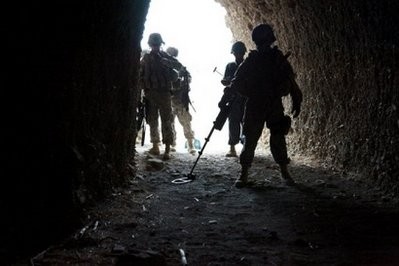Al-Qaeda hailed the suicide bombing at a CIA base in Afghanistan that killed seven agents as "revenge" for the deaths of top militants in US drone strikes, the monitoring group SITE said Thursday.
A Jordanian identified as Humam Khalil Abu-Mulal al-Balawi who was said to be a triple agent blew himself up at the base in Khost near the Pakistani border on December 30 in the deadliest attack against the CIA since 1983.
The head of Al-Qaeda in Afghanistan, Mustafa Abu al-Yazid, said the bomber wrote in his will that the attack was revenge for "our righteous martyrs" and named several top militants killed in drone attacks in Pakistan, SITE reported.
These included Baitullah Mehsud, the leader of Pakistan's Taliban blamed for a wave of deadly attacks including the killing of former prime minister Benazir Bhutto in December 2007.
Mehsud was killed when a US missile slammed into his father-in-law's house on August 5 last year.

Another militant named was Abu Saleh al-Somali, described as part of Al-Qaeda's core leadership and responsible for plotting attacks in Europe and the United States, was killed in a drone strike in the North Waziristan area in December last year.
The Al-Qaeda statement surfaced after another round of attacks by the remote-controlled aircraft that left 11 militants dead near Pakistan's Afghan border on Wednesday, the first strikes since the CIA bombing. Related article: US missiles strike Pakistan
The area is a stronghold of Hafiz Gul Bahadur, who fought with the Taliban when US-led troops invaded Afghanistan and is reputed to control up to 2,000 fighters whom he sends across the border but who do not attack in Pakistan.
Washington has put Pakistan at the heart of a new strategy for turning around the eight-year war against the Taliban in Afghanistan, hinging success on dismantling militant sanctuaries along the porous border.
Attacks by unmanned US spy planes have soared in the past year, while the extremists have vowed fierce retaliation.
Jihadist websites have said that Balawi was a triple agent who duped Western intelligence services for months before turning on his handlers.
The Jordanian intelligence services, believing the bomber to be their double agent, took him to eastern Afghanistan with the mission of finding Al-Qaeda number two Ayman al-Zawahiri, the websites and Western intelligence agents cited by US media said.
He blew himself up at Forward Operating Base Chapman, killing seven CIA agents and his Jordanian handler, a top intelligence officer and member of the royal family.
Intelligence experts said it was possible that the base let its guard down in searching the bomber because he was a coveted informant.
It was the deadliest single incident for the CIA since 1983, when eight agency employees were believed to have been among the dead when Islamic militants bombed the US Marine barracks in Beirut, killing 241 Americans and 58 French.
The attack came as the United States increasingly relies on the CIA and other covert forces to pursue strategic goals. CIA and special forces were at the forefront of the US invasion of Afghanistan after the September 11, 2001 attacks, paving the way to overthrow the Taliban's extremist regime.
The attack also killed two contractors with XE, the controversial private security firm once known as Blackwater, US media reported.
The two apprently were among seven CIA operative and a Jordanian intelligence officer killed in the December 30 attack, reportedly by a Jordanian double agent who blew himself up inside Forward Operating Base Chapman. Related article: Blackwater staff among CIA-base victims: reports
Their deaths were reported by local newspapers in Washington state and Virginia.
























